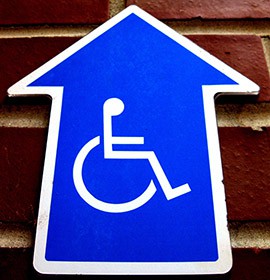Cronkite News has moved to a new home at cronkitenews.azpbs.org. Use this site to search archives from 2011 to May 2015. You can search the new site for current stories.
Four Arizona cities rank in top 10 on livability for people with disabilities
WASHINGTON – Four Arizona cities made the top 10 in the nation when it comes to suitable living conditions for people with disabilities, according to a recent ranking of the largest 150 cities.
The Wallethub report based the rankings on 23 different measures ranging from lowest cost of in-home services to walkability to number of physicians per capita.
Peoria ranked second overall, followed by Scottsdale in third place, Chandler in fifth and Gilbert in seventh place. Other Arizona cities ranged from Mesa in 37th place to Glendale at 118.
Advocates said there are still gains to be made for people with disabilities – particularly when it comes to employment – but that overall they were not surprised by the state’s relatively good showing.
“Well, it makes sense,” said Phil Pangrazio, president and CEO of the Arizona Bridge to Independent Living.
Pangrazio grew up in western New York but moved to Arizona shortly after a car accident at age 19 left him disabled. Many people with disabilities, especially those in wheelchairs, have moved to the state over the years “probably because of the weather,” he said.
Pangrazio cited the region’s relatively new infrastructure as one possible factor for the ranking. A Wallethub spokeswoman agreed that better infrastructure was a common element among the higher-ranking cities.
“We were not shocked at all” by the results, said Jill Gonzalez, the spokeswoman. “These cities tend to be younger cities.”
That means they are more likely to have elevators and buildings that meet modern code, she said.
Pangrazio also pointed to the decades-long history of advocacy in the state that makes it a desirable place for people with disabilities to live.
Even before Congress passed the Americans With Disabilities Act in 1990, prohibiting discrimination and ensuring equal opportunity for people with disabilities, supporters in the state were pushing for change, he said.
That advocacy continues today, said Madison Rogers, director of development and communications at Peoria-based One Step Beyond.
“I have always known that Arizona as a whole, providing social services for individuals with disabilities, is remarkably more accessible and you get a lot more provisions and services than in other places,” she said.
Rogers said she has seen “astounding differences” in the kinds of services available for adults with disabilities in Arizona and California, where One Step Beyond is thinking of opening another office.
Rogers said the reimbursement rate for agencies that provide services for disabled adults is significantly higher in Arizona than in northern California, where her organization is looking to expand.
But Rogers said sees areas where Arizona can improve, pointing to the lack of economic opportunities for disabled workers as the biggest challenge.
The Labor Department reported that 17.6 percent of all people with disabilities were employed in 2013, compared to 64 percent of those without disabilities. That year’s unemployment rate – those in the workforce without jobs – was 13.2 percent for people with disabilities and 7.1 percent for those without.
Pangrazio said access to jobs has been a problem for years and continues to disproportionately hit those with disabilities.
Rogers said the struggle to find work after the recession hit is even harder for those who have disabilities.
“Employers are just very, very hesitant to hire,” Rogers said. “They think that hiring someone with a disability is a risk.”
Anna Mineer, vice president of business and development at the Scottsdale Area Chamber of Commerce, said that broad-based hiring is not only good for business health, “it supports a strong community” as well.
“I think we need to make sure we remember everyone in our community and give everyone a fair chance at employment,” said Mineer, adding that the chamber is proud to serve Scottsdale where there is support for individuals with disabilities.
While increasing employment for people with disabilities is not an “easily solved issue,” Pangrazio said conditions are better now than they have been in past years.
“The positive side of it is that today’s economy is one that people with disabilities should be able to participate in more than ever before, because there are jobs out there that we can do,” Pangrazio said.
“We can become self-sufficient and independent by working and earning income rather than living off of Social Security and disability benefits,” he said.







